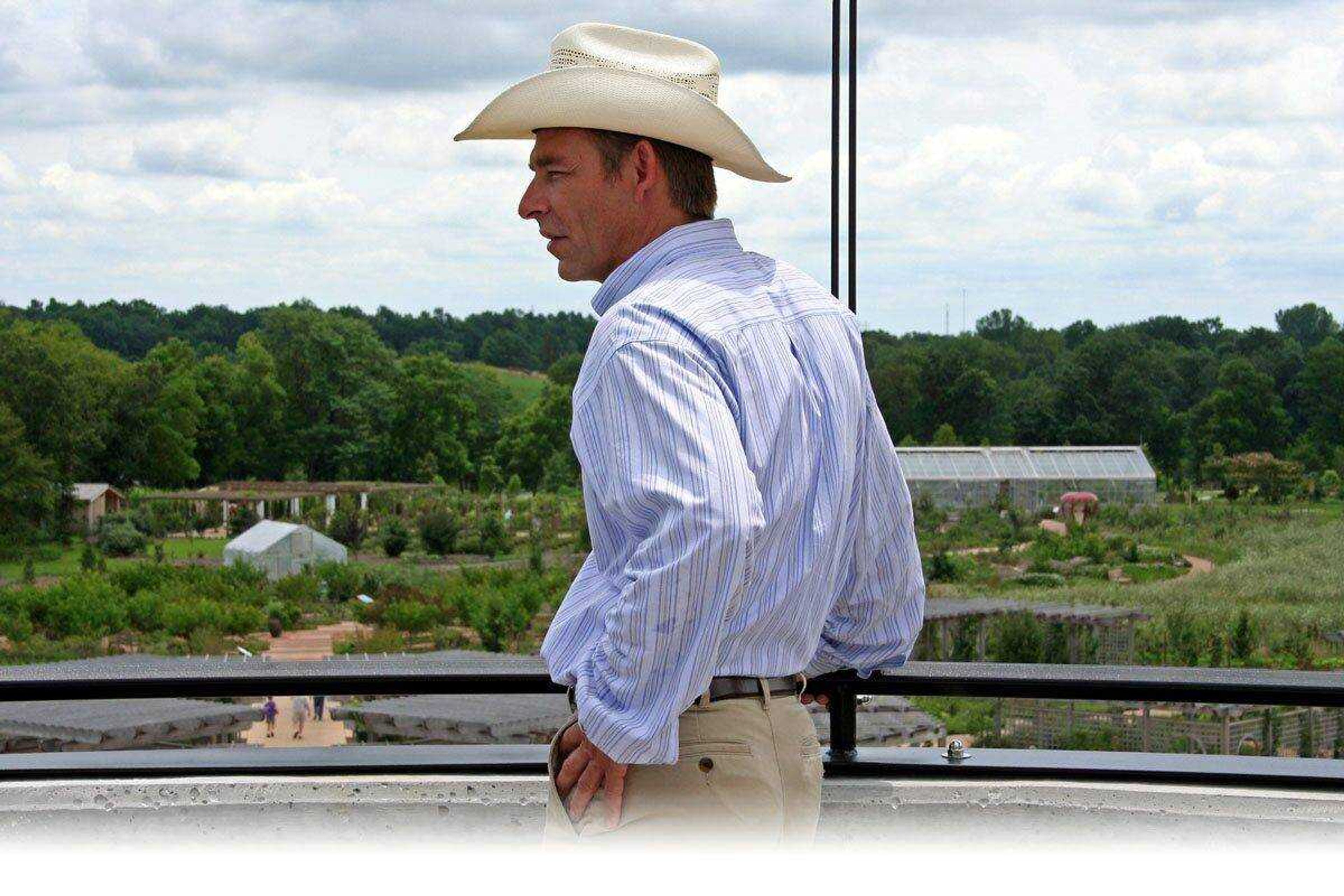Talking Shop with Dr. Jon Hagler, director of the Missouri Department of Agriculture
With his trademark cowboy hat on, Dr. Jon Hagler, the director of the Missouri Department of Agriculture, travels the state working with farms and agribusinesses. After the Birds Point levee breach last May, Hagler was one of the first state officials on the scene meeting with Mississippi County farmers. Friday he was back in Southeast Missouri, discussing the effect of Missouri's No. 1 industry and the challenges facing it with members of the Cape Girardeau Area Chamber of Commerce...
With his trademark cowboy hat on, Dr. Jon Hagler, the director of the Missouri Department of Agriculture, travels the state working with farms and agribusinesses. After the Birds Point levee breach last May, Hagler was one of the first state officials on the scene meeting with Mississippi County farmers. Friday he was back in Southeast Missouri, discussing the effect of Missouri's No. 1 industry and the challenges facing it with members of the Cape Girardeau Area Chamber of Commerce.
Hagler grew up in rural Dent County and continues to raise horses and cattle. Before becoming director, Hagler worked at the University of Missouri-Rolla and California State Polytechnic University -- Pomona, concentrating on corporate research and development, governmental affairs and international outreach.
Q: For generations now, those who grow up on the family farm are choosing other occupations, leaving only about 1.5 percent of Americans living on a farm or ranch today. What made you stay in agriculture?
A: For me, it's the values you learn. You grow up on a farm and it's a lot of hard work, sweat and dirt. You think, man I can't wait to get out of here. Then you go off to school and spend the rest of your life trying to get back to it. It grounds you. It gives you a sense of responsibilities.
Q: The Missouri Department of Agriculture's farmers market map lists more than 200 markets throughout the state, and in Missouri there has been about a 10 percent increase in the number of markets each year over the past decade. Plans for a new riverfront market in downtown Cape Girardeau were discussed here at a recent public forum. What's driving the growth of farmers markets in Missouri?
A: Consumers increasingly want to know where their food is produced and who is producing their food. They want to meet the farmers. Most folks when they go to visit a farmers market will actually plan a day. They'll go and plan on an hour and stay four. They want to share in that experience. They want to talk to the producers, the folks who actually have their hands in the soil. It's their way of connecting back to agriculture and where their food comes from. It's also the nostalgia they remember as a child or from their grandparents' house.
Q: Will there be a lasting impact to Missouri agriculture as a result of last year's flooding in Southeast Missouri after the intentional breach of the Birds Point levee by the U.S. Army Corps of Engineers?
A: First of all, our hearts go out to those farm families. I know a lot of them lost not only their homes but their way to make a living. The fortunate thing is that many people were able to get at least some crop out of there in the short term. They're some of the hardest working, most resilient people you'll see if your life. Gov. Nixon has fought so hard to ensure they rebuilt that levee up to its original height. That is going to be an important fight to get that land back into production. This notion that was put out early that you were trading lives on one side of the river for farmland on the other is really a false notion. The truth is, if your house is flooded, if you can't make a living, you don't care which side of the river you live on. It's important to put this land back into production here in the southeast, but also in the northwest [due to flooding along the Missouri River]. They didn't get any crops in this year and they didn't get much of a crop last year because of flooding two years in a row. I certainly hope we can work with the corps to have management practices in place so this doesn't occur. That farmland has to go back into production, is important not only for the world food supply but for those communities. When that land isn't in production, gas stations close, truck stops aren't operating and fertilizer plants aren't operating, and you can just go right on down the line. We are used to setting records in Missouri, and last year wasn't a record year in terms of production. Those numbers are still coming in, but our producing in terms of corn and soybeans was certainly down.
Q: How do you approach the increasing government regulations being placed on farm operations?
A: At the Department of Agriculture, we promote agriculture, but we also regulate agriculture. Our approach to regulation can be summed up by something I actually had painted on our conference room wall: Let common sense be our guide. I firmly believe that as a regulating philosophy. Sometimes you have to have regulation to protect other farmers as well as to protect consumers, other businesses, etc. At the federal level, they've started doing things that may on the surface sound good, but they're not practical in the way they're implemented and they defy common sense.
Connect with the Southeast Missourian Newsroom:
For corrections to this story or other insights for the editor, click here. To submit a letter to the editor, click here. To learn about the Southeast Missourian’s AI Policy, click here.






